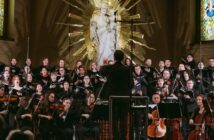
This page is also available in / Cette page est également disponible en:
![]() Francais (French)
Francais (French)
After 38 years as artistic director of the Petits Chanteurs du Mont-Royal, Maestro Gilbert Patenaude is ready to retire. What kind of musical and pedagogical legacy is he leaving?
In 1978, Patenaude became the first lay musical director of the Petits Chanteurs. In the 60 years since its founding, the choir’s primary mission has been to offer musical accompaniment for the religious services at Saint Joseph’s Oratory. Patenaude’s arrival was a change of pace for the young singers. He took on the artistic direction and musical training, and still had time to compose his own pieces, including three operas.
Just a few months after he was hired, Maestro Patenaude and the Petits Chanteurs performed a Christmas concert with none other than Luciano Pavarotti. The choir conductor had to direct the imposing soloist as well as the choir, all the while dealing with the legacies of his predecessors, still fresh in the singers’ memories. But if the concert with Pavarotti was an important moment in the history of the Petits Chanteurs, the important moment for Gilles Patenaude himself was a Petits Chanteurs concert in Wales. The program included Max Reger’s Mein Odem ist schwach, a work for four mixed voices. An audience member admitted to Patenaude that even the local universities couldn’t perform the score, as it was so difficult. “I could die tomorrow, knowing I’ve heard the most beautiful music,” said the admiring audience member.
Patenaude summarizes his philosophy thus: one should be engaged in everything one does, and always in the service of others. He wanted to establish a certain rigour and devotion to his work, a certain ethic and know-how. For example, it was important to establish a calm atmosphere during rehearsals in order to ensure a job well done. The conductor often began rehearsals by citing this rule. He seems to have succeeded in teaching his philosophy: with a smile, he recalls that most of the messages that he receives from former students are from those who were the most boisterous. These alumni now admit that the maestro was right, and they’re grateful to have picked up his philosophy.
“It’s not easy to make a group of young people understand the importance of singing in a sacred place like the Oratory,” says Fr. Claude Grou, rector at Saint Joseph’s Oratory. “With rigour and patience, Mr. Patenaude has for many years instilled all the young singers with this respect for the sacred.” The Petits Chanteurs are effectively always present for Sunday mass. Religion “is the deal of a lifetime,” says Patenaude. He therefore avoided imposing on students’ spiritual development, even if, for him, his Christian faith is his priority. The maestro insists rather that singers “do it for those who come to mass.”
Thus, “95% of singers are there for mass and other services at the Oratory,” states Patenaude, in spite of their sometimes-diverse religious beliefs. The singers are indeed diligent. The young singers recently told him that one of their favourite performances was The Stations of the Cross, for which the music includes many sacred works. The choir often performs pieces taken from the secular repertoire, especially popular music.
How does the maestro succeed in training young singers? The fact that he’s a layperson plays an important role: his experience as a parent has helped him to understand and direct his students. The rigorous selection process during auditions is certainly helpful: the Master requires that students demonstrate a certain amount of discipline. But the fact remains that the choirmaster knew how to establish a severe and demanding atmosphere, with the sole aim of producing valuable music. He admits that when he began, he indulged his humour, but he quickly realized that it was eroding discipline and modified his approach. It seems to have been effective: he recalls that during the entr’acte of one concert, he heard his singers relaxing and talking about nothing but music amongst themselves. It will be understood that Maestro Patendaude knew how to transmit by osmosis his passion for music.
For him, one “must be a musician first of all” in order to be an artistic director. But his priority is his faith, and his involvement with the Petits Chanteurs and Saint Joseph’s Oratory is no surprise. For him, music is more important than the financial aspect or the glory. In 1978, he accepted the position not for the money or the status, but because it offered him the opportunity to serve others. Fittingly, his three favourite books are, he says, “the Bible, Jean Lafontaine’s Fables, and The Little Prince by Antoine de Saint-Exupéry.” All his beliefs can be found there, and they’ve certainly influenced his trajectory to become choirmaster of the Petits Chanteurs. After his last tour of the American northeast with his choir, Maestro Patenaude will retire in July. He bequeaths his students his passion for music, and especially his great energy and his values.
Translation: Rebecca Anne Clark
Voyage en Amérique française, Les Petits Chanteurs du Mont-Royal, May 1, 3:30 p, at Salle Marguerite-Bourgeoys. www.pcmr.ca
This page is also available in / Cette page est également disponible en:
![]() Francais (French)
Francais (French)












